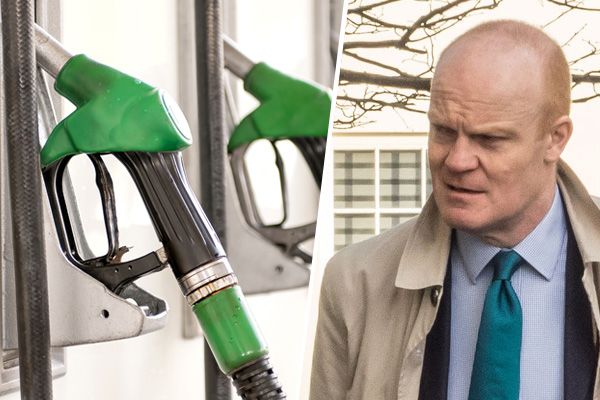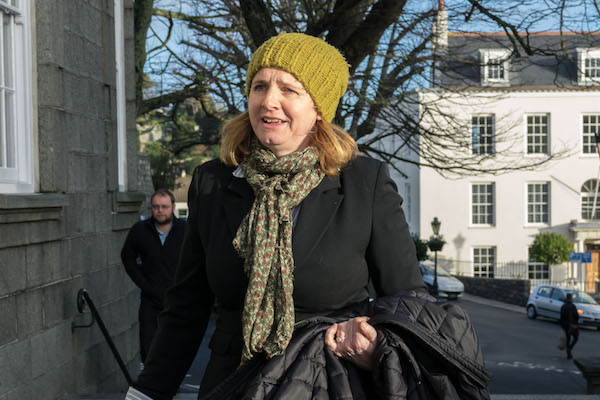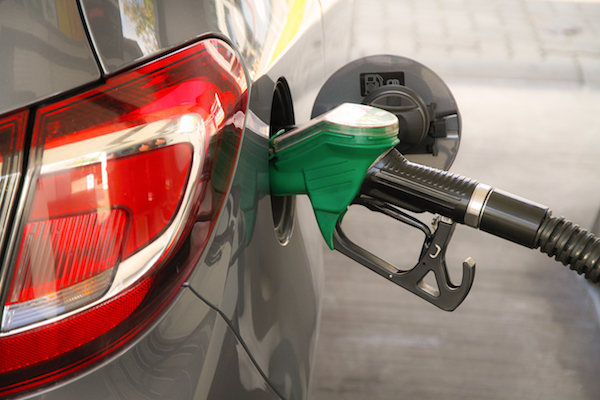

Deputy Gavin St Pier has promised to sort out the 'fuel duty issue' and will look again at ways of stopping the ever increasing amounts we pay at the pumps to fill up.
He had to apologise during yesterday's States debate on the 2019 Budget proposals after his plans to put fuel duty up by 3.1 pence per litre were challenged by numerous deputies.
Deputy Jennifer Merrett had wanted a 'Fuel Duty Review Committee' set up "to consider and review the best way of raising sustainable revenues in respect of motor vehicles, fuels and otherwise in relation to motoring in future, with the object of maintaining such revenues of the States at their current levels, taking into account the ongoing reduction in income derived from fuel duty, and based as far as possible on the 'user pays' principle."
That was defeated by just one vote in the States, along with Deputy Merrett's efforts to get fuel duty put back to 67pence per litre. Another amendment from deputies Ferbrache and Kuttelwascher trying to get fuel duty set at 67pence was also defeated.

Pictured: Deputy Jennifer Merrett.
With no other amendments against the fuel duty rise currently lodged or expected it is likely to be confirmed at 70.1 pence for the coming year when the overall budget is voted on either today or tomorrow.
But Deputy St Pier has promised his Policy and Resources Committee will bring a report back to the States next year looking at "the issue."

Pictured: Fuel duty is staying at 70.1 pence per litre under the 2019 Budget despite efforts to reduce it.
Deputy St Pier has previously acknowledged the apparent public discontent against annual fuel duty rises. Speaking to Express when he published the 2019 Budget proposals he said the increase in fuel duty, as with the rises in alcohol and tobacco duty, follow previously agreed States policies, which were put in place before he was elected Policy and Resources President, and even before he served a term as Treasury Minister under the previous machinery of government.
Now, speaking during yesterday's debate on fuel duty rises as part of the 2019 Budget discussions, he argued that the average price in fuel duty paid by the average household won't increase by a huge amount over the course of a year under the proposals before the States.
Deputy St Pier also warned that tinkering with the budget proposals through the numerous lodged amendments could have serious repercussions. He said that each amendment on its own would not affect the promised £1million budget surplus the States is looking at, but each amendment would accumulatively affect that when looked at with those other amendments that were to follow.
The P&R President repeated that any expenditure would need to be reduced by the same amount to replace any revenue lost as income to the States coffers.

Pictured: Deputy St Pier referred to the "average" and "ordinary motorist" in his speech, but it wasn't clear what that meant.
During yesterday's debate Deputy St Pier referred to the "ordinary motorist" and said there had been plenty of talk about a "hammering at the pumps" and "enough is enough".
He insisted that the average or ordinary motorist is not taking a hammering at the pumps, and that based on data collected during a household expenditure survey in 2012, the average household would be spending an extra £26.50 on fuel duty if the States agreed the additional 3.1 pence should go on for 2019.
An alternative way of looking at it, he said, came from information presented by the Committee for the Environment and Infrastructure which has previously said the average car drives 4,000 miles a year in Guernsey - and with an average of 30 miles to a gallon, equating to 600 litres of fuel a year, that extra 3.1 pence of fuel duty per litre would see that driver pay an additional £18.72 in duty per year.
Deputy St Pier said based on those two different methods of gathering data, the average household will be spending an additional amount on fuel duty of between £18.72 and £26.50 per year.
The P&R President said that should help everyone "maintain perspective when we talk about a hammering at the pumps."
He said it is easy to use language such as that and hyperbole when discussing fuel duty rises which are more complex than they appear and that we should also avoid comparisons with the rate of fuel duty paid in either Jersey or the UK, which is unfair.
Deputy St Pier explained that as Jersey has GST on services, insurance and repairs and the UK has VAT at 20% on all those things plus the MOT, it is irrelevant what fuel duty motorists there pay when compared to motorists in Guernsey.
He said we have to look at Bailiwick requirements as we have a different tax base to other jurisdictions, and the P&R President again explained that the repeated increases in fuel duty can be traced back to the decision by the then-States to introduce Zero 10. He said maintaining fuel duty was now the challenge.
Those sentiments did not go unchallenged by opposing deputies though, with Deputy Peter Roffey among those voting against the increase in fuel duty by supporting both attempts to have it reset at 67p per litre.

Pictured: Deputy Peter Roffey voted against both amendments to try and freeze fuel duty.
Previously during the debate, Deputy Roffey had said P&R was being given a last chance to sort out the issues over fuel duty, with Deputy St Pier repeating his promise that his committee would take a report back to the States during 2019, which he said would not be unanimous but it would address alternative ways of raising money.
The P&R President apologised for the delay and failings of his committee in addressing the fuel duty issues, and said he couldn't promise to act on a request made by Deputy Jeremy Smithies to put a pause on fuel duty rises next year, saying it would be considered by P&R as he insisted this debate will be heard.
The amendments were destined to be defeated when Deputy Rhian Tooley, who had originally seconded one of the attempts at freezing fuel duty, changed her mind and withdrew from seconding it and then voted against it. But Deputy St Pier said the object of the amendment had been achieved and that although the 2019 Budget proposals on fuel duty would be accepted, the States would have a report by September 2019 which will address fuel duty and will move the debate on.
Pictured: Deputy Gavin St Pier, who is seen by some as being responsible for repeated increases in fuel duty.
Comments
Comments on this story express the views of the commentator only, not Bailiwick Publishing. We are unable to guarantee the accuracy of any of those comments.